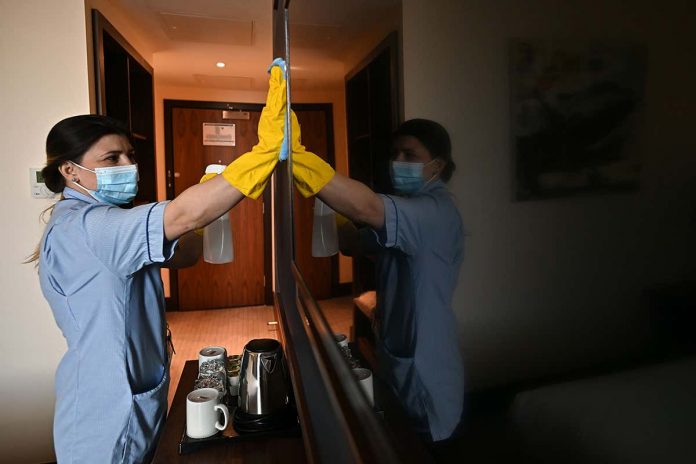
A member of staff cleans surfaces at the St Giles Hotel, near London’s Heathrow Airport, one of England’s designated covid-19 quarantine hotels.
Ben Stansall/AFP via Getty Images
From Monday 15 February, travellers arriving in England from a “red list” of 33 countries will be required to quarantine in a hotel for 10 days. But the ruling has been criticised as too little, too late, with not enough consistency to be effective.
Travellers will be required to quarantine at their own expense, taking a covid-19 test on day two and day eight of their stay. The quarantine will be extended if a person tests positive.
Advertisement
The UK government has announced tough measures for individuals who provide false or deliberately misleading information in regards to their travel. Offences may provoke fines of up to £10,000 or a 10-year prison sentence.
Scotland will require all arriving air passengers to quarantine in hotels, while Wales will enforce the same rules as England.
UK health secretary Matt Hancock told parliament on 9 February that he had sought advice from the Australian Government on implementing hotel quarantine measures.
However, it is unclear what lessons learned from the Australian system will be implemented.
Like many other countries that have successfully controlled the spread of covid-19 – including New Zealand, Vietnam and Taiwan – Australia has had strict border control measures in place for nearly a year. Since 27 March 2020, returning residents have been required to spend 14 days in hotel quarantine.
“In the case of Australia, the goal is to eliminate the risk of international travellers bringing covid-19 into an environment where we have no community spread,” says Nancy Baxter at the University of Melbourne. “But when your country has one of the world’s biggest outbreaks, I’m not really sure what you’re gaining by having hotel quarantine – other than being ready for when you do get your numbers to the point where international travellers pose a greater risk to your community than just going to the grocery store,” she says.
“I think it might very well be too late,” says Beverley Paterson at the University of Newcastle in Australia.
Hancock has said that the border rules are needed to “secure the nation against new variants of coronavirus”.
However, given that the new quarantine rules will be enforced only for passengers returning from red-listed countries, many researchers think they are unlikely to be effective. “Clearly there are political reasons that countries are or aren’t on that list. It’s not a risk-based plan,” says Baxter.
For instance, the US isn’t on the red list, despite the rapid spread of a new virus variant in California. “The likelihood of something being introduced from America is just enormous,” says Paterson. There is a huge number of cases in the US, and it is probable that many more new variants will arise there, she adds.
Labour leader Keir Starmer and Scotland’s first minister Nicola Sturgeon have both criticised the incompleteness of England’s approach.
The policy for travellers arriving in England also goes against advice issued in a meeting of the UK’s Scientific Advisory Group for Emergencies (SAGE) on 21 January, which concluded that “no intervention, other than a complete, pre-emptive closure of borders, or the mandatory quarantine of all visitors upon arrival in designated facilities, irrespective of testing history, can get close to fully prevent the importation of cases or new variants”.
Lessons to learn
It will be important that hotel quarantine workers in the UK are adequately protected to minimise the risk of infection and further community transmission.
In Australia, infections in hotel workers have led four cities to enact snap lockdowns since November, including one announced today in Melbourne. A leak from hotel quarantine was also responsible for the second wave in Melbourne in July, triggering 111 days of lockdown.
Hotel quarantine workers should be adequately remunerated so that they don’t need to work multiple jobs, says Baxter, and candidates should be screened to exclude individuals with close contacts working in high-risk areas such as in care homes.
In the Australian state of Victoria, workers are tested for covid-19 daily, including on their days off, and wear fitted N95 masks. Baxter says that hotel quarantine workers must also be vaccinated as a priority.
To minimise transmission risk, UK hotels used for quarantine would do well to copy those in Australia, which are adequately ventilated, with windows and balconies that open to the outside. Staggered mealtimes may also help to prevent transmission between those quarantined in different rooms.
But these measures may end up being a waste of effort if large gaps in the system aren’t addressed. “If the UK wants to do it properly, they need to quarantine every person coming into the UK,” says Paterson. “There’s no point in half measures.”
Sign up to our free Health Check newsletter for a round-up of all the health and fitness news you need to know, every Saturday
More on these topics:











